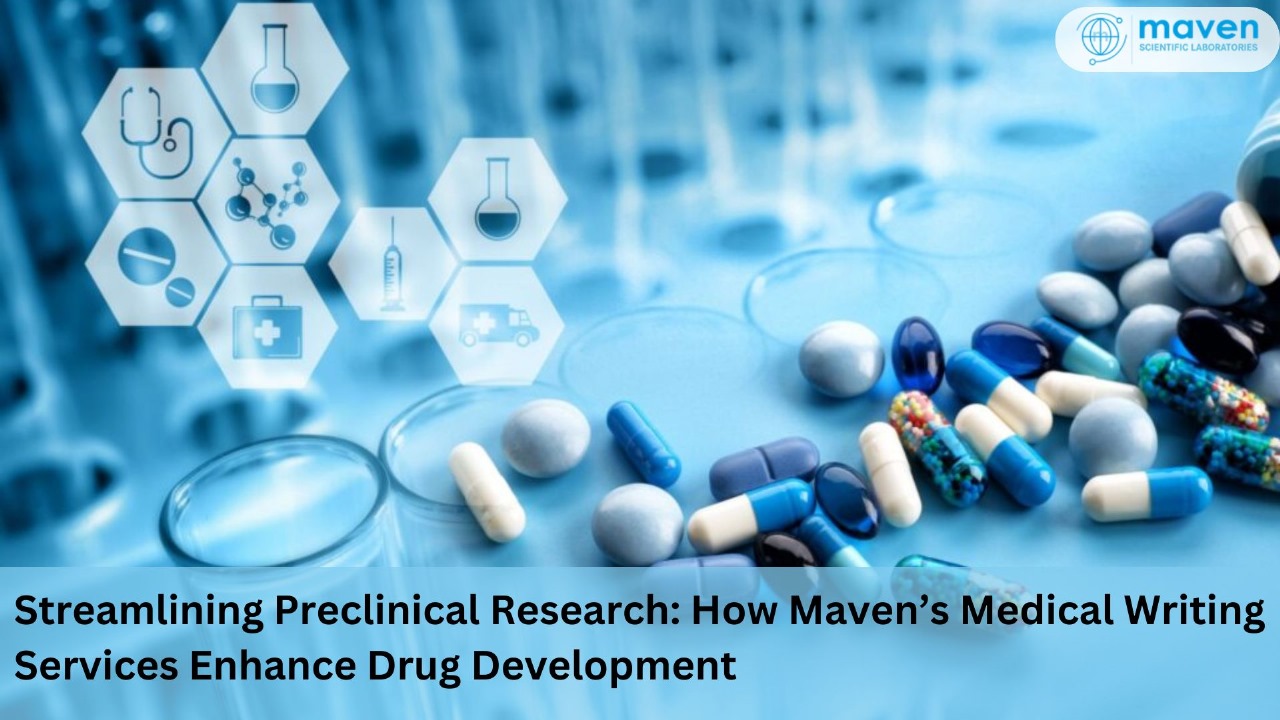
Streamlining Preclinical Research: How Maven’s Medical Writing Services Enhance Drug Development
In the realm of drug development, preclinical research serves as a crucial bridge between drug discovery and clinical trials. This stage involves rigorous testing to evaluate a drug candidate’s safety, efficacy, and pharmacological properties. Medical writing plays a vital role in this context, ensuring that the complex data generated during preclinical studies is documented and communicated accurately to regulatory authorities. Maven, a leader in medical writing services, supports this process by creating high-quality, regulatory-compliant documents that meet industry standards.
The Role of Medical Writing in Preclinical Research
Preclinical research generates a large volume of intricate data that must be meticulously recorded and presented in line with regulatory expectations. Key documents produced during this stage include:
- Preclinical Study Reports: Detailed reports covering experimental design, methodology, results, and conclusions for studies involving pharmacodynamics (PD), pharmacokinetics (PK), and toxicology.
- Nonclinical Overview and Summary: Summaries that provide a high-level view of the drug’s safety profile and pharmacological properties.
- Regulatory Documents: Integration of preclinical data into submission documents, such as the Common Technical Document (CTD) and Investigational New Drug (IND) applications, in line with FDA, EMA, and ICH requirements.
Expert medical writers are essential for transforming complex scientific data into clear, accurate, and compliant documents that support regulatory review and approval processes.
Maven’s Medical Writing Services for Preclinical Research
Maven offers a comprehensive suite of medical writing services tailored to the needs of preclinical research. Here’s how Maven’s expertise supports organizations:
- Expertly Crafted Preclinical Study Reports: Maven’s medical writers collaborate with scientists or contract research organizations (CROs) to produce detailed, scientifically accurate, and regulatory-compliant reports.
- Regulatory Document Preparation: The team assists in creating submission-ready documents for regulatory authorities, ensuring that preclinical data is presented concisely and accurately for IND and CTD submissions.
- Cross-Functional Collaboration: Maven’s writers work across scientific disciplines to compile diverse data into cohesive documents that meet regulatory standards.
- Clear and Concise Communication: Maven excels at translating complex scientific data into accessible language for stakeholders and regulatory authorities.
- Quality Assurance and Compliance: Maven adheres to rigorous quality standards and regulatory compliance, ensuring all documents meet the guidelines set by regulatory bodies.
Key Regulatory Guidelines for Preclinical Research
Achieving regulatory compliance in preclinical documentation requires adherence to various guidelines:
- FDA Guidance on Nonclinical Studies: The FDA’s guidance documents, such as the Guidance for Industry: Format and Content of the Nonclinical Pharmacology/Toxicology Section of an IND and General Considerations for Animal Studies for INDs, outline the expectations for the structure, content, and rigor of preclinical submissions.
- ICH M3(R2) Guidelines: The ICH M3(R2) Guidance on Nonclinical Safety Studies for the Conduct of Human Clinical Trials and Marketing Authorization for Pharmaceuticals sets standards for preclinical testing, including toxicity studies, pharmacokinetics, and safety.
- EMA Preclinical Requirements: The European Medicines Agency’s (EMA) guidelines, such as Directive 2001/83/EC, provide standards for preclinical research in drug development, with an emphasis on data quality and ethical standards in animal studies.
- OECD GLP Guidelines: The Organization for Economic Cooperation and Development (OECD) guidelines outline Good Laboratory Practices (GLP) for preclinical research, ensuring consistency, reliability, and transparency in study conduct and reporting.
These regulatory guidelines emphasize data integrity, transparency, and rigorous safety evaluation, underscoring the critical role of skilled medical writers in meeting these standards.
Why Work with Maven? The Advantages
Partnering with Maven for medical writing services offers distinct benefits:
- Specialized Expertise: Maven’s writers have in-depth knowledge of preclinical drug development, ensuring documents are scientifically accurate and compliant.
- Regulatory Knowledge: The team’s familiarity with FDA, EMA, and ICH standards supports alignment with global regulatory requirements.
- Efficient Delivery: Maven is committed to timely document delivery, helping clients meet their project deadlines.
- Collaborative Approach: Maven’s writers work closely with clients, tailoring solutions to meet their specific documentation needs.
- Cost-Effective Solutions: Maven provides competitive pricing without compromising quality, delivering excellent value for regulatory-compliant documentation.
Conclusion
Maven stands out as a trusted partner in preclinical medical writing, offering expertise in producing regulatory-compliant documents that effectively communicate complex scientific data. By supporting quality and compliance in preclinical documentation, Maven helps streamline the drug development process, ensuring timely and successful regulatory submissions. Organizations looking to enhance their preclinical research documentation can benefit significantly from partnering with Maven’s experienced team of medical writers.







